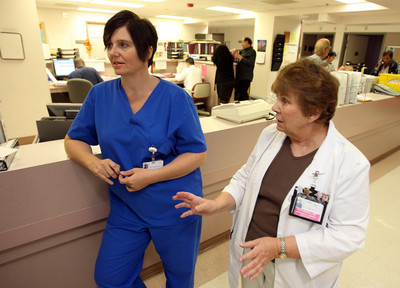End-of-life planning urged
As a nurse manager of Valley Hospital Medical Center's medical surgery floor, Lisa Fahrnlaender knows all too well the pain associated with the death of a parent, sibling or child.
But through her work and own personal experience with death, Fahrnlaender knows it can be beneficial to have talked about end-of-life issues in advance of a diagnosis of a terminal illness.
And though the holidays might not seem the right time to bring up such conversations, the next month or so might actually be ideal considering family and friends traditionally spend time with each other, Fahrnlaender and other health officials say.
"It is so important that families discuss their wishes well before something happens, for oftentimes we can be surprised by what people whom we believe we know so well would actually want if they were in, for example, a DNR (do not resuscitate) situation,'' said Marin Gillis, a bioethicist and director of medical humanities and ethics at the University of Nevada School of Medicine at Reno.
"The majority of DNR orders are written shortly before a patient's death," she said in an e-mail. "It would make decisions much less difficult for patients if they had already made their end-of-life decisions when they were competent and while they had the time to go over any questions with their physicians.''
If family members are clear about such issues ahead of time, Gillis said, it gives everyone an opportunity to reflect on facts and personal values, and discuss their thoughts and wishes with loved ones.
In Nevada, there are two ways a person can convey end-of-life wishes to family, friends and health care providers, both through what are known as advance directives.
The first is through a durable power of attorney for health care document.
Through that method, an individual designates someone to make health care decisions for them if they can't make them on their own. That individual can be anyone age 18 and older, except for the physician providing care.
The designee has the legal right and responsibility to make decisions that include the initiation and termination of medical procedures and life support systems, organ donation and autopsy.
The second advance directive is known as a declaration or living will.
Within that document, the individual does not designate or appoint someone to make health care decisions for them but declares what they would like to happen in the event their medical condition is incurable. In most cases, the declaration informs medical care providers to not delay death, if it is imminent, through lifesaving measures.
Ellie Powell, a Valley Hospital critical care nurse, said a person can use either or both of those documents. Neither needs to be notarized, she said. However, there must be at least two witnesses to the document.
The witnesses cannot be a relative or someone who is to benefit from the person's estate, she said.
Even though advance directives are important and can help relieve stress on loved ones, Powell, also a nurse ethicist, said they are used by fewer than 5 percent of the population.
"Nobody wants to talk about death, much less their own,'' said Fahrnlaender who dealt with her own mother's terminal illness a few years ago. Her mother had an advance directive which, she said, lessened her own stress.
"I see a lot of conflict among family members after they hear about a loved one's terminal condition. When there's no plan in place, that conflict only runs deeper,'' she said.
"It can be very difficult to hear a doctor say your loved one is dying, then you have to turn around and make decisions for them that you think are right but may not be what that person wants.''
With her own mother, Fahrnlaender said she felt guilty because here was the person who gave her life, and she was essentially taking it away from her by honoring the advance directive.
"It was her last wish. ... That gave me peace,'' she said.
As a result of her mother's death, and her experiences with patients, Fahrnlaender, 38, created her own advance directives. Fahrnlaender said two people are designated to make medical decisions if she can't.
Those decisions include whether to use feeding tubes or resuscitation and the donation of her organs.
"I have two children that I need to think about,'' Fahrnlaender said. "This isn't just about me.''
Gillis said each student at the School of Medicine must take a course in human behavior their first year. That course includes information on end-of-life issues in clinical care as well as physician/patient communications.
For the general public, Gillis said, Nevadans can learn more about advance directives through the publicly funded Nevada Center for Ethics and Health Policy.
The center has offices in Las Vegas and Reno.
"It is something that is difficult to bring up, but it would help health professionals a lot if they knew what the wishes of people were,'' Gillis said.
If not during the holidays, advance directives could become something to add to the paperwork to be done going into 2008, said Powell, who also goes out into the community and educates residents about Nevada's advance directive laws.
"I think a lot of people, from my experiences when I go out, are afraid someone will go against their wishes, that their wishes won't be honored,'' she said. "This is a misconception.''
Contact reporter Annette Wells at awells@reviewjournal.com or (702) 383-0283.

















